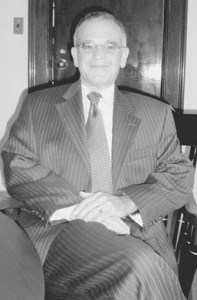Fordham Adds New Administrative Position to Further Strategic Plan
May 26, 2011
FORDHAM – On Aug. 1 Dr. Stephen Freedman began his post as Fordham’s new senior vice president of Academic Affairs. Dr. Freedman was also appointed chief academic officer, a position that is new to Fordham. The added position entails a broadened responsibility in Academic Affairs that will help the university attain a position of prominence among the nation’s Catholic universities, Freedman said.

“I am confident that he will lead the university as we strive to achieve the ambitious goals we set for ourselves in the Strategic Plan,” the Rev. Joseph M. McShane, S.J., president of Fordham said in a statement.
Freedman replaced Dr. Judith Mills, the interim vice president for Academic Affairs. He comes directly from Gonzaga University in Spokane, Wash., where he served as the academic vice president, McShane said.
As the new senior vice president for academic affairs and chief academic officer, Freedman’s primary responsibilities are ensuring and enhancing the academic life of the institution, along with paying attention to curricular and programmatic issues that students face, he said.
“I work primarily with academic deans of all schools and with others in carrying out the Strategic Plan that has begun,” Freedman said. “As chief academic officer, I work closely with the faculty in representing their views throughout the university, and I maintain close relations with the faculty and the Faculty Senate.”
The position of senior vice president for Academic Affairs has been broadened to provide the person in this role with more responsibility in overseeing academics, budget planning, resource allocation, and coordination among schools and colleges, Freedman said.
One of the major reasons for the creation of the chief academic officer position is the university’s Strategic Plan, which calls for Fordham to be the pre-eminent Catholic university in the country by the year 2016, although it also has to do with the faculty. “They are looking for a stronger role in this position, and so is the president,” Freedman said.
Freedman said that Fordham is very different from Gonzaga. “I think Fordham is a more complex institution,” he said. “It has a wider array of graduate and professional programs, and it has much more of a research focus, similar to Loyola, where I spent 24 years.”
In 1978, Freedman joined the faculty of Loyola University of Chicago, where he taught in the natural science and biology departments. He was later appointed the Dean of Mundelein College of Loyola University in 1994, where he remained until 2002 ,when he assumed the academic vice presidency at Gonzaga.
Freedman sees his role as helping Fordham move forward and making decisions based on a forward-thinking style. “I want to look at how we are positioned looking into the future and not just necessarily in the next six months or the next year,” he said.
Most importantly, he feels that every decision should be made to benefit the students. “I have a strong student focus,” Freedman said. “I really believe that everything we do has to benefit students in a very concrete way – how they shape their educational experiences and how it impacts them.”
Although he has only been here since the beginning of August, Freedman said he has really enjoyed getting to know the people at Fordham and that it is a very welcoming community. As for the city, he claims he is still getting used to it. “I like the nature of the interactions with people,” he said. “And I am still adjusting to the traffic and the intensity of life in the city.”











